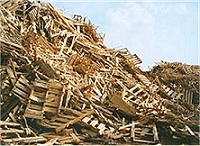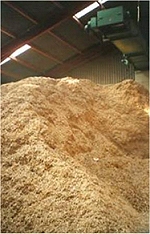


Wood WasteAlthough initially conceived for developing countries to utilise agri-fibre waste and to help with creating jobs and wealth in rural areas the Ecopanel Systems ‘come of age’ with regards to that of Industrialised Nations. |

|
| Unfortunately, the vast majority of existing wood based plants can only utilise
the highest quality of ‘clean wood’ that is being recycled.
This is because their systems are mainly based on formaldehyde resin, are this restricts such plants in what they can truly recycle. Therefore leaving the remaining wood based material for landfill and burning, neither of which are truly acceptable, landfill will cease in the very near future and burning simply increases greenhouse gases. With Ecopanel Systems all wood based products can be turned into board, regardless of their origin and/or previous processing. This is due to the specially formulated binding system EcoBond, this unique formula and manufacturing system allows any type of wood based waste and/or agri-fibre waste to be made into board. Unlike formaldehyde-based systems, the products made by the Ecopanel System are infinitely recyclable, there is virtually no waste and the economic viability creates a very short payback time indeed. Waste extracted from saw benches and planers, despite tending to have high moisture content, are one of the easiest materials to use. It can be dried prior to processing to improve its performance, if desired, as high moisture content can cause the board to shrink during the curing cycle. As the material is relatively dense in bulk, far more can be processed at any one time. Finished board can be used in the same manner as conventional chipboard. |
|
Finer wood waste from sawmills – particularly hardwood – are prime material for the Ecopanel process and the resulting board can be likened to a much higher quality of panel, such as MDF. Other sources of waste that can be converted into board are from Plywood manufacture, Veneer manufacture, chipboard manufacture, board covered with melamine, paper foil etc can also be processed without detriment to board quality. |

|
|
Again the more traditional formaldehyde based particleboard manufacturing systems, can only utilise about 5% - 10% of chipboard waste otherwise board quality may suffer, with the Ecopanel System 100% of such wood waste can be utilised with no detriment at all to board quality. |

© 2005 Ecopanel Systems Ltd